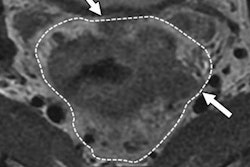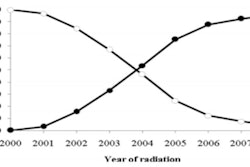
Combined treatment with radiotherapy and surgery is only an option in the treatment guidelines, but patients with advanced rectal or rectosigmoid cancer live longer when they receive both, according to a presentation at the American Society of Clinical Oncology (ASCO) Gastrointestinal Cancers Symposium.
Analyzing data from more than 10,000 patients, researchers from Tufts Medical Center found that the combination of radiation and surgery generally improved survival for both rectal and rectosigmoid cancer patients compared to either treatment alone. If only one could be chosen, however, radiation therapy tended to be the stronger option.
 Jennifer Logan from Tufts Medical Center.
Jennifer Logan from Tufts Medical Center.
"When you look at the percentage of survivals, the groups that got a combination of both radiation and surgery did significantly better, and though it's a little more difficult to deduce for the next part, those who received radiation as opposed to surgery did better than the surgery-alone group," said Tufts researcher and medical student Jennifer Logan in an interview with AuntMinnie.com.
Preferred options
The 2012 National Comprehensive Cancer Network (NCCN) practice guidelines state that one of the preferred options for patients with advanced metastatic rectal or rectosigmoid cancer includes pelvic radiation therapy in combination with either 5-fluorouracil or capecitabine chemotherapy plus resection, if possible. At Tufts, these patients are treated with surgery and radiation therapy for local control, Logan said.
"But there's no real data for that [treatment plan], and we started discussing whether it was sort of a Tufts treatment plan, if it was based on attending preference, and how does it look nationally," she said. The study looked at stage IV disease because it has the least literature behind it.
"In terms of literature, there's not much in the U.S. in the way of randomized, controlled trials, but if you look at Korea there are actually a couple retrospective trials that offer differing opinions -- one trial says there is a slight local control benefit with radiation but no improvement in overall survival," Logan said.
In the current study, which was presented as a poster at the January meeting, patients with stage IV rectal or rectosigmoid disease were identified in the Surveillance, Epidemiology, and End Results (SEER) database from 1973-2009.
The patients were stratified by disease site, as well as T and N stages, and whether they received radiation, surgery, or both. Logan, along with Dr. Thomas DiPetrillo, Dr. Kara Lynne Leonard, and colleagues, compared radiation therapy rates based on stratified factors using a Fisher's exact test.
Treatment type and cancer location
|
In the rectal cancer group, the vast majority received radiation with or without surgery, while the opposite was true for patients with rectosigmoid cancer. Radiation as a part of therapy is more common in stage IV rectal primary cancers than rectosigmoid.
Survival based on treatment modality
|
|||||||||||||||||||||||||||||||||||||||
The results showed that both two- and five-year survival rates differed substantially between treatment groups, with the highest survival rates among patients receiving both surgery and radiation therapy.
In addition, the researchers found that use of radiation therapy differed significantly between those with T1-T2 and T3-T4 disease (p < 0.001) and between those with N0 and N1 or N2 disease (p < 0.001). In very ill patients such as these, survival benefits of a few weeks can be important, Logan added.
"I wanted to break it down by N and T stage; for metastatic patients, that's not looked at as often," Logan said. "When you combine the data by group, the early T stage and late T stage in both groups have a greater likelihood of being treated with some form of radiation or in combination with or without surgery, whereas if you're later stage you're more likely to be treated with surgery alone."
Patients received radiation both before and after surgery, and patient numbers were small for some categories, making it hard to get too specific about treatments and outcomes. Finally, the study team decided not to calculate p-values, which are best left uncalculated in the setting of survival percentages for various treatment options, Logan said.
Radiation therapy is more commonly used in primary rectal versus rectosigmoid cancers, but absent specific recommendations, treatment decisions, especially at the most advanced stages of disease, may come down to "a lot of attending/patient discussion and probably just attending inclination," she said.



















